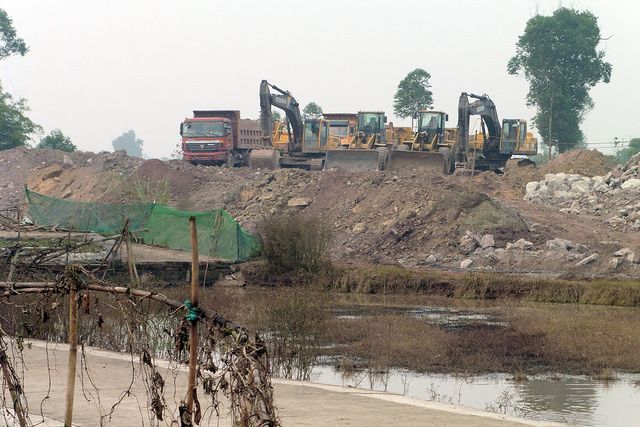By Nicholas Tagliarino, World Resources Institute
June 13th, 2016
In almost all countries, governments have legal authority to acquire land for public needs, including roads, schools and other public infrastructure, as long as they compensate affected landholders. This process is commonly referred to as expropriation. But in many countries, weak expropriations laws open the door for governments and companies to take land for private interests without adequately compensating and resettling displaced people. A new working paper from WRI’s Land and Resource Rights Initiative and the University of Groningen, shows that many national laws fail to adopt international standards designed to effectively limit expropriation power, protect local land rights and ensure responsible land governance.
The paper’s comprehensive analysis of laws and regulations in 30 countries across Asia and Africa reveals wide gaps between expropriation laws and international standards, as established in the Voluntary Guidelines on the Responsible Governance of Tenure and endorsed by the UN Committee on World Food Security in 2012.
Here are six ways to bridge these gaps and bring national laws up to international standards.
1. Clearly define public purpose
Only four of the 30 countries have expropriation laws that provide a clear definition of what constitutes a public purpose for taking land. In the other 26 countries reviewed, definitions of public purpose are vague, and governments are often given broad authority to declare what constitutes a public purpose. In Zambia, for example, any land can be taken whenever the president is “of the opinion” that land is needed for a public purpose. Provisions like these can allow executives to take land under the pretext of a public purpose without ensuring an actual public benefit is generated. In Ethiopia, vague legal provisions allowed the government to expropriate land to benefit a private company, which ultimately failed to fulfill a public purpose objective.
2. Limit how much and what kind of land governments can take
Only three of the 30 countries assessed -- India, Malaysia and Taiwan -- require governments to limit the amount of land acquired to what is necessary to achieve a public purpose. In India, Taiwan and the Philippines, governments must be sensitive to areas of cultural significance and land held by poor and vulnerable groups, such as indigenous and local communities. However, in many other countries, there are no legal limits on how much and what kind of land governments can expropriate.
3. Establish transparent and participatory expropriation processes
Only three of the 30 countries -- India, Vietnam and Indonesia – require governments to survey, inform and consult residents before taking land. In the other 27 countries, expropriation decisions may be made behind closed doors. In Tanzania, World Bank research showed that decisions about expropriation were usually made in secret, leading to mistrust of the government and a public perception that expropriations were pushing out poor and indigenous landowners to allow the rich or the state to reap major benefits.
4. Compensate those who hold land under customary tenure
Only six of the countries ensure compensation to holders of customary tenure rights (rights based on community-based rules, norms and practices that often go back centuries) and users of undeveloped areas. Because customary landholders, including indigenous and local communities, often lack formally recognized rightsto land they have long inhabited, the other 24 countries may fail to adequately protect communities from expropriation without compensation.
5. Ensure gender-sensitive, sufficient compensation is paid
None of the 30 countries have laws ensuring gender-sensitive compensation. While India’s law partially addresses gender issues, compensation procedures in the other 29 countries are gender-neutral, meaning they are silent on whether compensation must reflect the differing ways in which women and men hold and use their land and resources. In societies where women are considered dependents of their husbands, and have no direct rights to land, compensation is usually paid to the male head of household, which could be detrimental to the family’s health and welfare. Without special legal protections ensuring women landholders are compensated, they are at risk of being disproportionately burdened by expropriations.
Only the Philippines has a law that ensures that compensation reflects the historical and cultural values associated with the land. In other countries, compensation may be insufficient to cover the livelihood losses borne by indigenous and local communities. A recent USAID study in Rwanda found that 77 percent of expropriated households surveyed experienced income loss after their land was taken, and their income dropped by an average of more than 30 percent.
6. Minimize forced evictions; provide relocation allowances, alternative housing and access to productive alternative land
India’s 2013 Land Acquisition Law is the only law assessed that provides robust rehabilitation and resettlement procedures. In the other 29 countries, displacement landholders face a greater risk of poverty, illness and other problems. In Bangladesh, 103 of 133 households -- 77 percent -- surveyed said their economic status worsened after resettlement.
Looking Ahead: Legal Reform Needed
Encroaching on Land and Livelihoods establishes a benchmark for progress to assist civil society organizations, NGOs, policymakers, and other stakeholders in measuring government progress towards adopting international standards on expropriation in domestic laws. By adopting the standards set forth in the Voluntary Guidelines, governments can ensure that national laws adequately protect land tenure, human rights and livelihoods. The research is out; it is now time for governments to reform laws and govern the world’s land responsibly.


